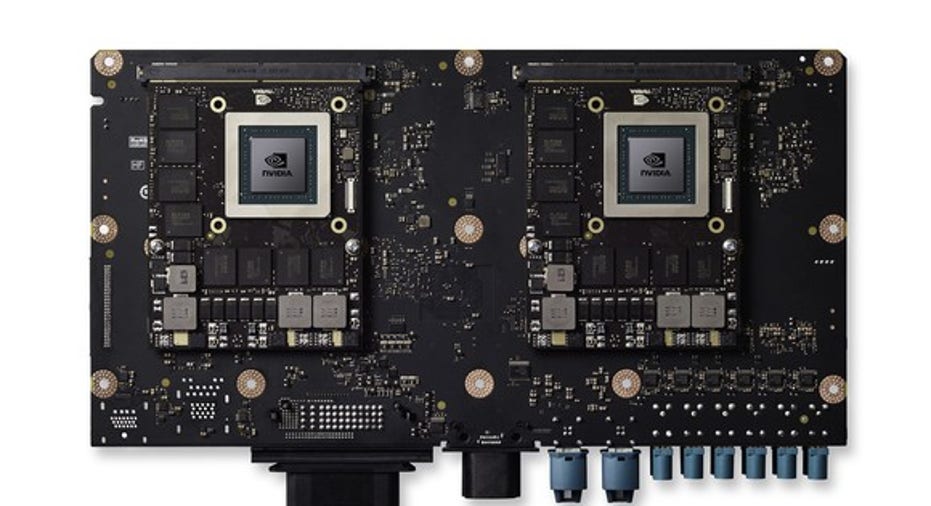Tesla Motors Inc. Is Using NVIDIA Corporation's Drive PX 2

Last week, Tesla Motors (NASDAQ: TSLA) announced that, going forward, all the vehicles that it produces will be equipped with the necessary hardware to enable self-driving cars. At the time of the announcement, reports suggested that the hardware inside consisted of an NVIDIA (NASDAQ: NVDA) Titan graphics processor.
Drive PX 2. Image source: NVIDIA.
However, per an announcement from NVIDIA itself, the Tesla vehicles aren't using Titan graphics cards; instead, they will be equipped with an NVIDIA product known as the Drive PX 2.
How much does the NVIDIA Drive PX 2 cost?
NVIDIA sells its Titan graphics card for around $1,200 directly through its website. In a previous analysis, I estimated that Tesla would get a significant bulk discount, perhaps on the order of $400 per unit. This would put NVIDIA's incremental content per car at around $800 -- a very respectable figure.
However, since we now know that NVIDIA is instead supplying a Drive PX 2 platform rather than a single graphics card, NVIDIA might be taking in much more than that per Tesla car.
Electrek reports that NVIDIA was selling Drive PX 2 development kits for $15,000, but at this price, the economics for Tesla don't work out. (Tesla is apparently charging $8,000 extra to enable this self-driving functionality, and the hardware will come pre-installed in all new Tesla cars.)
It wouldn't be shocking, though, if NVIDIA were selling Drive PX 2 to Tesla for an average price between $1,000 and $1,500.
Recalculating the revenue impact
My previously published analysis assumed that NVIDIA would be able to get around $800 per car, and it also assumed that Tesla vehicle unit deliveries would stay at around 79,000 (though it's unlikely that Tesla's deliveries will flatten out anytime soon given its current growth trajectory). Based on these assumptions, however, NVIDIA could stand to see approximately $63 million in incremental, annual revenue.
If we ratchet up the assumption around average selling price from $800 per car to $1,250 per car (the midpoint of the range given above), then that potential revenue opportunity moves up from roughly $63 million to close to $100 million. And assuming no substantial price declines, as Tesla's volumes grow, so too would that revenue opportunity.
The fundamental investment thesis doesn't change
At the end of the day, NVIDIA's automotive business is still very small, though it has been growing quite quickly. This Tesla win, though likely to be significant to the growth rate of NVIDIA's automotive business, is still small in the context of the graphics specialist's overall revenue base.
Nevertheless, the important part of this win isn't necessarily about how much revenue NVIDIA stands to see from Tesla, although it would be quite nice. Rather, it is the fact that there appears to be a market for platforms that do more than just power in-vehicle infotainment systems within the automotive segment.
Self-driving car platforms add much more value and are much more difficult to design than a relatively simple infotainment system. Should there be a market beyond Tesla for such platforms, then not only does NVIDIA's automotive business have a fairly large revenue growth opportunity ahead of it, but there's quite a bit of room for gross profit margins -- and ultimately profits -- to expand, too.
A secret billion-dollar stock opportunity The world's biggest tech company forgot to show you something, but a few Wall Street analysts and the Fool didn't miss a beat: There's a small company that's powering their brand-new gadgets and the coming revolution in technology. And we think its stock price has nearly unlimited room to run for early in-the-know investors! To be one of them, just click here.
Ashraf Eassa has no position in any stocks mentioned. The Motley Fool owns shares of and recommends NVIDIA and Tesla Motors. Try any of our Foolish newsletter services free for 30 days. We Fools may not all hold the same opinions, but we all believe that considering a diverse range of insights makes us better investors. The Motley Fool has a disclosure policy.



















